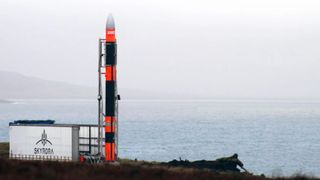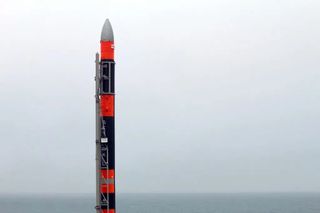Scottish rocket startup Skyrora fails on 1st space launch attempt
The test flight didn't meet the mark, but Skyrora says the launch was a milestone on its journey to space.

A Scottish rocket startup failed last weekend in its first-ever attempt to reach space, but it says the effort was a milestone nonetheless.
Edinburgh-based Skyrora got its suborbital Skylark L rocket successfully off an Icelandic launch pad on Saturday (Oct. 8). But the booster didn't go far, falling into the Norwegian Sea about a third of a mile (500 meters) from the coastal site, company officials said.
No people or wildlife were harmed, and Skyrora has begun an investigation into the anomaly. "Despite the best design, build and test preparations, anomalies still unfortunately do happen," Lee Rosen, chief operations officer at Skyrora, said in a statement.
The mission, from Langanes peninsula in northeastern Iceland, wasn't necessarily expected to meet success, given that it was a debut effort. Company representatives said the attempt was a "milestone" as they aim to perform the first-ever successful vertical orbital launch from the United Kingdom in 2023.
Related: Rocket startup Skyrora wants to salvage an iconic UK satellite in space for museum display

Conditions at the launch site were tricky, Skyrora added, with "severe storms and freezing temperatures" in the days before the attempt.
Though the launch didn't succeed, Skyrora managed to check other boxes, including packing up and transporting the 36-foot-tall (11 m) rocket and support facilities to the Icelandic site in a shipping container in less than a month. (Skyrora had raised issues with licensing in May, claiming that Skylark L was ready to fly in late 2021 but was grounded by Icelandic red tape.)
Get the Space.com Newsletter
Breaking space news, the latest updates on rocket launches, skywatching events and more!
Skylark L is designed to reach a maximum altitude of more than 77 miles (125 kilometers) and fly at four times the speed of sound. The vehicle is being used to prepare for the larger Skyrora XL vehicle, which is slated to launch from the United Kingdom next year. The company completed a key engine test of Skyrora XL's second stage in August, described as the "largest integrated stage test" conducted in the U.K. in 50 years.
Skyrora is among several U.K. companies seeking to provide launch services for small satellites. Two vertical spaceports in Scotland's north have scheduled launches in 2023, while a converted airport in Cornwall, in the southwest of England, will host a launch by Virgin Orbit no earlier than November. Should the Virgin Orbit launch go to plan, it will be the first-ever orbital launch from the U.K., but not the first such vertical liftoff; Virgin Orbit's LauncherOne rocket ignites in midair after being dropped by a carrier plane.
The Oct. 8 launch was Skyrora's first attempt to reach space but not its first liftoff overall. The company has launched its Skylark Nano and Micro rockets to lower altitudes multiple times over the past few years.
Follow Elizabeth Howell on Twitter @howellspace. Follow us on Twitter @Spacedotcom or Facebook.
Join our Space Forums to keep talking space on the latest missions, night sky and more! And if you have a news tip, correction or comment, let us know at: community@space.com.

Elizabeth Howell (she/her), Ph.D., is a staff writer in the spaceflight channel since 2022 covering diversity, education and gaming as well. She was contributing writer for Space.com for 10 years before joining full-time. Elizabeth's reporting includes multiple exclusives with the White House and Office of the Vice-President of the United States, an exclusive conversation with aspiring space tourist (and NSYNC bassist) Lance Bass, speaking several times with the International Space Station, witnessing five human spaceflight launches on two continents, flying parabolic, working inside a spacesuit, and participating in a simulated Mars mission. Her latest book, "Why Am I Taller?", is co-written with astronaut Dave Williams. Elizabeth holds a Ph.D. and M.Sc. in Space Studies from the University of North Dakota, a Bachelor of Journalism from Canada's Carleton University and a Bachelor of History from Canada's Athabasca University. Elizabeth is also a post-secondary instructor in communications and science at several institutions since 2015; her experience includes developing and teaching an astronomy course at Canada's Algonquin College (with Indigenous content as well) to more than 1,000 students since 2020. Elizabeth first got interested in space after watching the movie Apollo 13 in 1996, and still wants to be an astronaut someday. Mastodon: https://qoto.org/@howellspace
